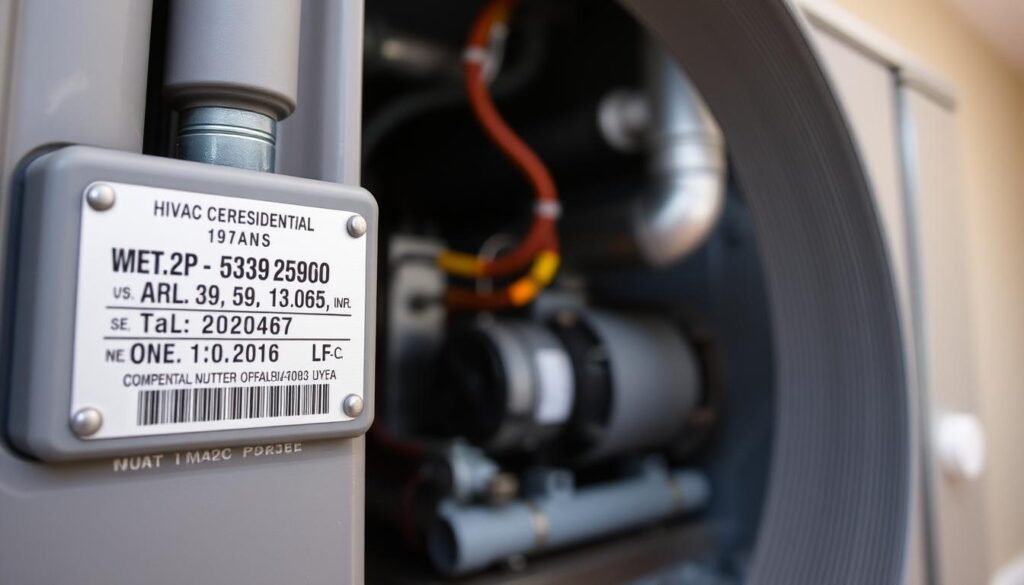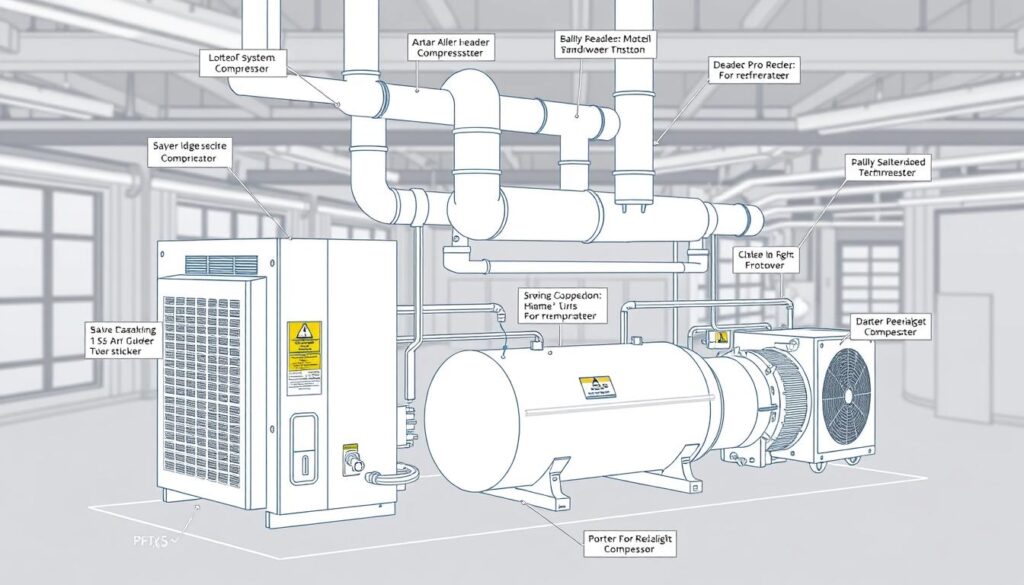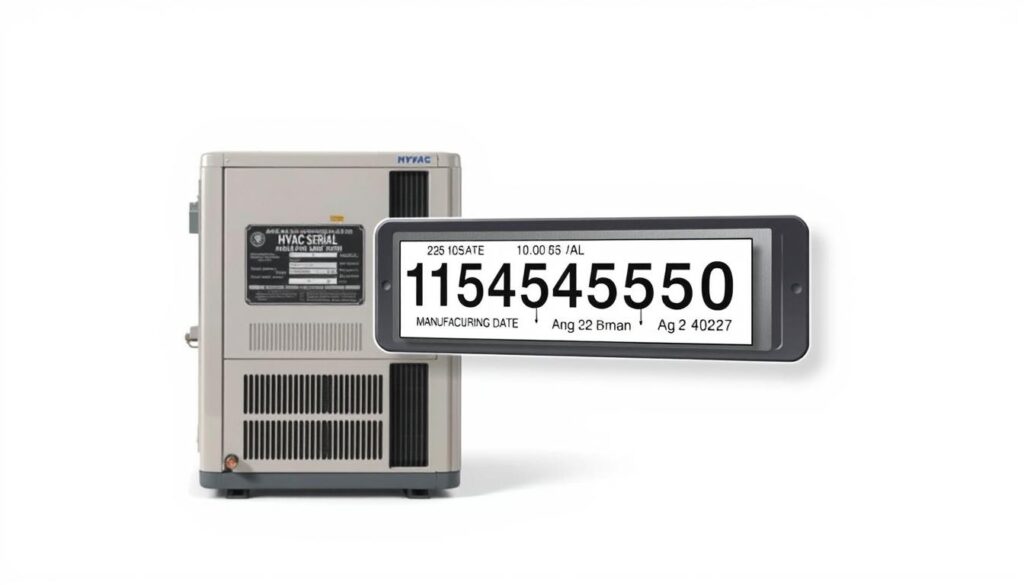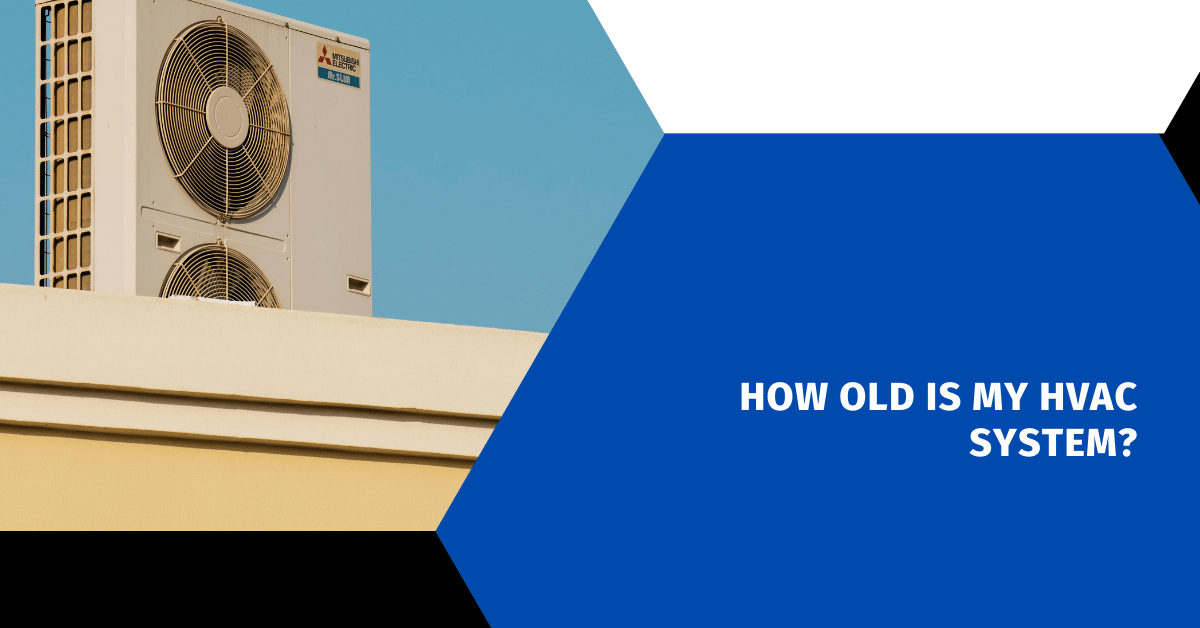Affiliate Disclosure
HVAC Guide Guys is a participant in the Amazon Services LLC Associates Program, an affiliate advertising program designed to provide a means for sites to earn advertising fees by advertising and linking to Amazon.
How Old Is My HVAC System? Ever thought about how long your HVAC system has been keeping your home comfy? Knowing your HVAC’s age is key. It helps you spot problems early, plan for new systems, and save on energy.

In Utah, air conditioners usually last 10 to 15 years. But your system might be different. Finding out how old your HVAC is can save you from big repair bills and keep your home comfy in any weather.
This guide will show you how to find your HVAC’s age. You’ll learn about its life expectancy and when it’s time for maintenance or a new system.
Key Takeaways
- HVAC system age directly impacts performance and efficiency
- Most heating and cooling systems last 10-15 years
- Regular maintenance can extend your system’s lifespan
- Knowing your HVAC age helps with budget planning
- Early detection of aging signs prevents costly breakdowns
Table of Contents
Understanding HVAC System Lifespan Basics
Your HVAC system is a big deal for home comfort. Knowing how long it lasts helps with planning, budgeting, and keeping it running well. Each part of your HVAC system has its own lifespan, based on several things.
Average Service Life Expectations
Here’s how long different parts of your HVAC system usually last:
- Furnaces: 15-20 years
- Air Conditioners: 10-15 years
- Heat Pumps: 10-15 years
- Water Heaters: 8-12 years
Factors Affecting System Longevity
Several things can make your HVAC system last longer:
- How well it was installed
- How you use it
- The weather and environment
- How harsh the climate is
Impact of Regular Maintenance
Keeping up with regular maintenance can really help your system last longer. Getting it checked by pros and doing routine upkeep can add 5-10 years to its life.
| Maintenance Activity | Frequency | Expected Benefit |
|---|---|---|
| Filter Replacement | Every 3 months | Improved Air Quality |
| Professional Inspection | Annually | Extended System Life |
| Coil Cleaning | Bi-annually | Enhanced Efficiency |
Proactive maintenance is key to maximizing your HVAC system’s performance and longevity.
Why Knowing Your HVAC System’s Age Matters
Knowing how old your HVAC system is is key to smart home care. The age of your system affects its performance, energy use, and repair costs. By tracking your system’s age, you can plan for future expenses and keep your home comfortable.
Knowing your system’s age offers many benefits:
- Financial Planning: Get ready for replacement costs
- Energy Efficiency: Check your system’s current energy use
- Maintenance Strategy: Decide when to repair or replace
- Warranty Tracking: Keep track of warranty periods
Older HVAC systems use more energy. A system over 10-15 years old may use a lot more energy than newer ones. This means higher bills and less comfort in your home.
Homeowners who watch their system’s age can save thousands on repairs and replacements.
Checking your system’s age regularly helps you make smart choices. You might get rebates for energy-efficient upgrades and save money in the long run.
Explore Our HVAC Shop
Looking for top-rated HVAC tools, parts, and accessories? Visit our shop and find the perfect solution for your needs.
Visit the ShopHow Old Is My HVAC: Methods to Determine System Age
Finding out how old your HVAC system is can be easy. Homeowners can find their hvac installation date using several methods. Knowing your HVAC’s age helps you plan for maintenance and possible replacements.
Finding your HVAC system’s age takes some detective work. But, there are many ways to find out when it was installed.
Checking Installation Documentation
Start by looking for any paperwork related to your HVAC. You should check:
- Original installation contract
- Home purchase records
- Maintenance logs
- Warranty information
Finding Manufacturing Date on Unit
The unit itself holds important age information. Look at the outdoor condenser unit’s nameplate. It usually shows:
- Manufacturer name
- Model number
- Serial number
- Manufacturing date
Decoding Serial Numbers
Serial numbers can tell you when it was made. While they vary, most have a common pattern. Pro tip: Many manufacturers’ websites have serial number decoders to find your system’s age.
Knowing your HVAC system’s age empowers you to make informed maintenance and replacement decisions.
If you’re having trouble, a professional HVAC technician can quickly figure out your system’s age. They can also give you insights into its condition and how long it might last.
Locating Important HVAC System Information

Finding out how old your HVAC system is can save you money and time. Every HVAC system has important details about its age and performance. Knowing where to find this info is essential for managing your home’s heating and cooling.
The outdoor unit of your HVAC system is a good place to start. A metal plate on the unit has vital details about its age and specs. This plate is your main source for figuring out the HVAC system age.
- Check the outdoor condensing unit first
- Look for a metal identification plate
- Examine the serial number carefully
When looking for your HVAC age, focus on the serial number. Most makers hide the manufacturing date in this number sequence. Some use a format where the first digits show the week and year it was made.
Pro tip: Take a clear photo of the identification plate for future reference and easier tracking of your HVAC system age.
If the outdoor unit’s info is hard to read or damaged, look elsewhere. The indoor air handler or furnace cabinet might have similar plates. You can also find details about the manufacturing date and model number in these spots.
- Indoor air handler
- Furnace cabinet
- Installation documentation
For accurate identification, consider getting help from a professional HVAC technician. They can decipher complex serial numbers and give insights into your system’s age and maintenance history.
Common Signs of an Aging HVAC System
Knowing when your HVAC system is getting old can prevent sudden failures. It also helps control your energy costs. Your heating and cooling system doesn’t fail suddenly. It shows signs of wear and tear over time.
As your HVAC system ages, it sends out signals that it’s not as healthy as it used to be. Spotting these signs early can help you plan for a new system. This way, you can avoid expensive emergency repairs.
Performance Issues to Watch
- Inconsistent cooling or heating throughout your home
- Longer run times to reach desired temperatures
- Frequent system cycling on and off
- Weak airflow from vents
Physical Signs of System Wear
Your aging HVAC system may show physical signs that it’s nearing the end:
- Unusual grinding, squealing, or banging noises
- Visible rust or corrosion on external components
- Increased dust accumulation in living spaces
- Visible moisture or refrigerant leaks
Energy Efficiency Decline
A big sign of an aging HVAC system is higher energy costs. Here’s how efficiency changes with age:
| System Age | Energy Efficiency | Estimated Cost Impact |
|---|---|---|
| 0-5 years | High | Baseline |
| 10-15 years | Moderate | 15-25% increase |
| 15+ years | Low | 30-50% increase |
If you see many signs of aging, it’s time for a professional check. Regular maintenance and timely replacements can keep your energy costs down and your home comfortable.
Explore Our HVAC Shop
Looking for top-rated HVAC tools, parts, and accessories? Visit our shop and find the perfect solution for your needs.
Visit the ShopUnderstanding HVAC Serial Number Formats

Figuring out how old your HVAC system is can be hard. But knowing about serial number formats is key. Each maker has its own way of coding that tells you when it was made.
Most HVAC serial numbers have a pattern that shows how old they are. The first four characters usually tell you when it was built. Here’s a look at common serial number formats:
- Numeric formats: The first two digits often show the week it was made
- Alphanumeric codes: Some makers use letters and numbers for the production date
- Manufacturer-specific patterns: Each brand has its own way of identifying it
Big names like Trane, Carrier, and Goodman have their own serial number styles. For instance:
| Manufacturer | Serial Number Format | Age Identification |
|---|---|---|
| Trane | First 4 digits (week/year) | Easy to decode |
| Carrier | Letter/number combination | Requires specific decoding |
If figuring out your HVAC’s age is tough, don’t worry. Here’s what to do:
- Find the serial number on your unit
- Look up the maker’s website for decoding tips
- Call a pro HVAC tech for help
Knowing your HVAC’s age helps you plan for upkeep and maybe a new one. If you’re unsure, getting help from a pro can give you the right info.
When to Consider HVAC Replacement Based on Age
Deciding when to replace your HVAC can be tough. The age of your system is key. Most last 15-20 years, but other factors can also play a part.
When your system hits 15 years, check its performance and efficiency. Older systems are less reliable and cost more to keep up.
Cost-Benefit Analysis Strategies
Do a cost-benefit analysis to decide on an upgrade. Look at these important points:
- How often you’ve had repairs
- Are your energy bills going up?
- Is your home temperature not even?
- Are repair costs more than half of a new system’s price?
Energy Efficiency Improvements
New HVAC systems save a lot of energy. They can cut your energy use by 20-40%, saving you money over time.
“Investing in an HVAC replacement today can save you money and improve your home’s comfort tomorrow.” – HVAC Industry Expert
When thinking about replacing your HVAC, look for high SEER ratings and the latest tech. These can greatly lower your energy bills and make your home more comfortable.
Explore Our HVAC Shop
Looking for top-rated HVAC tools, parts, and accessories? Visit our shop and find the perfect solution for your needs.
Visit the ShopMaintaining Older HVAC Systems
Keeping an aging HVAC system running well needs a smart maintenance plan. Your maintenance schedule is key to making your heating and cooling last longer. Regular care can boost efficiency and stop expensive repairs.
Important maintenance tasks for older HVAC systems include:
- Monthly air filter replacements to ensure optimal airflow
- Quarterly inspection of electrical connections
- Biannual professional system tune-ups
- Annual thorough system check
Homeowners can help their aging HVAC system in several ways:
- Clean air vents and registers often
- Keep outdoor units free from debris and plants
- Watch for unusual noises and system performance
- Keep thermostat settings steady
Professional maintenance is more vital as your HVAC system gets older. Certified techs can spot problems early, avoiding big failures and high repair costs. They’ll check refrigerant, oil moving parts, and ensure everything works right.
Regular maintenance is cheaper than replacing your HVAC system too soon.
With a steady maintenance plan, you can get the most out of your older HVAC system. This saves money and keeps your home comfortable.
Conclusion
Knowing how old your HVAC system is is key to a comfortable home. It helps you decide on maintenance, repairs, and upgrades. These choices can save you money and make your home more efficient.
Keeping your HVAC system in good shape is essential. Regular checks can spot problems early, avoiding expensive fixes. If your system is showing its age, think about upgrading. This can make your home more energy-efficient and save you money in the long run.
Caring for your HVAC system is a smart move. New, energy-saving systems can cut down on your bills and make your home more comfortable. Whether you’re staying put or planning to sell, a well-kept HVAC system adds value to your home.
Take control of your home’s comfort by staying informed and scheduling inspections. Be ready to upgrade your HVAC when needed. Your future self will thank you for the smart choice and savings.

